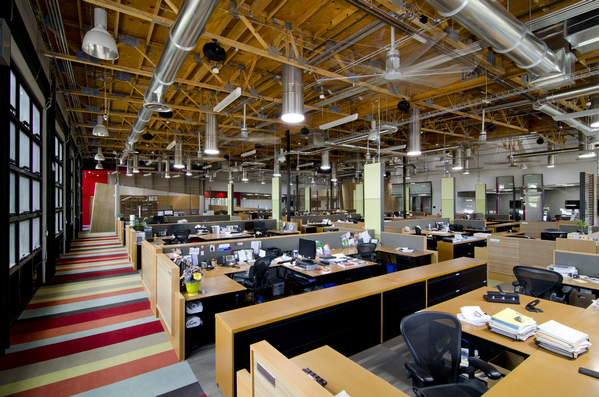New research reported in the June 2014 issue of the Journal of Clinical Sleep Medicine is showing that daylight-deprived workers are literally losing sleep. This can mean poor performance at work and changes in attitude, memory and metabolism, say the study’s authors.
Conducted by researchers at Northwestern Medicine and the University of Illinois at Urbana-Champaign, the study found that employees with more light exposure at the office had longer sleep duration, better sleep quality, more physical activity and better quality of life compared to employees with less light exposure in the workplace.
|

|
|
Workers sleeping patters are affected by lighting in office environments. (Photo Courtesy of Solartube)
|
Based on the findings, the authors of the study determined there is a direct correlation between employee health and access to daylight in the workplace. As a result, they suggested architects should place a high priority on designing office environments that provide occupants with sufficient natural lighting.
“Architects need to be aware of the importance of natural light not only in terms of their potential energy savings but also in terms of affecting occupants’ health,” said co-lead author Mohamed Boubekri, an associate professor of architecture at the University of Illinois at Urbana-Champaign.
Installing tubular daylighting devices (TDDs) is one popular solution for bringing natural light into the work environment. These unique lighting systems capture, transfer and deliver daylight into building interiors using breakthrough optical technologies. Affordable and easy to install, they work on both retrofits and new construction without the expense or inconvenience that comes with installing windows and skylights. They also cost nothing to operate and are guaranteed not to leak or transfer heat, making them a smart investment.
 |
|
Workplace lighting. (Photo Courtesy of Solartube) |
During the study, employees with daylight in the workplace received 173 percent more white light exposure during work hours and slept an average of 46 minutes more per night than employees who did not have the natural light exposure in the workplace.
“There is increasing evidence that exposure to light during the day—particularly in the morning—is beneficial to your health via its effects on mood, alertness and metabolism,” said senior study author Phyllis Zee, M.D., a Northwestern Medicine neurologist and sleep specialist. “Workers are a group at risk because they are typically indoors often without access to natural or even artificial bright light for the entire day. The study results confirm that light during the natural daylight hours has powerful effects on health.”
Zee is the Benjamin and Virginia T. Boshes Professor of Neurology at Northwestern University Feinberg School of Medicine and Director of the Sleep Disorders Center at Northwestern Memorial Hospital.













